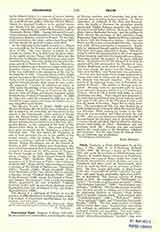

Pesch , TILMANN, a Jesuit philosopher, b. at Cologne, February 1, 1836; d. at Valkenburg, Holland, October 18, 1899. He became a Jesuit on October 15, 1852, and made his novitiate at Friedrichsburg near Munster; he studied classics two years at Paderborn, philosophy two years at Bonn; taught four years at Feldkirch, Switzerland; studied theology one year at Paderborn and three years at Maria-Laach, after which he made his third year of novitiate at Paderborn. He then taught philosophy at Maria-Laach (1867-69). From 1870 till 1876 he worked in the ministry, and again taught philosophy eight years (1876-84), at Blyenbeck. The literary activity of Pesch began in 1876. He contributed to “Philosophia Lacensis”; “Institutiones philosophiae naturalis” (1880); “Institutiones logicales” (1888); “Institutiones psychologicae” (1896-98). The last fifteen years of his life were devoted entirely to writing and to the ministry. By publishing treatises in German, Pesch helped much to spread Catholic truth. Such treatises were “Weltphanomenon” (1881), “Weltratsel” (1884), “Seele and Leib” (1893), and “Christliche Lebensphilosophie” (1895). The last work reached its fourth edition within three years. Besides these more scholarly writings, he published popular philosophic and apologetic articles and pamphlets. The most important of these were the articles published in the “Germania” above the pseudonym “Gottlieb”; they were later arranged in two volumes, “Briefe aus Hamburg” (1883), and “Der Krach von Wittenberg” (1889), refuting the usual calumnies against the Church. His most popular book was “Das Religiose Leben”, of which thirteen large editions have appeared. During all this period of literary activity, Pesch was tireless as a missioner in Germany. He was often arrested under charge of being a Jesuit. Pesch taught the best in Scholasticism, but appreciated what was good in other systems of philosophy. His Latin writings contain the latest results of natural science applied to the illustration of truth by scholastic methods.
WALTER DRUM

